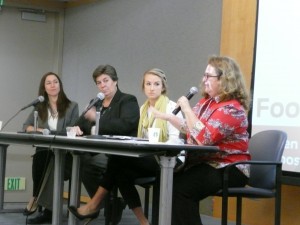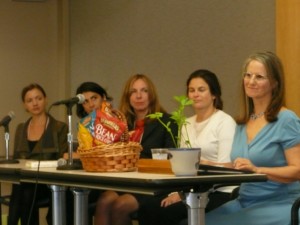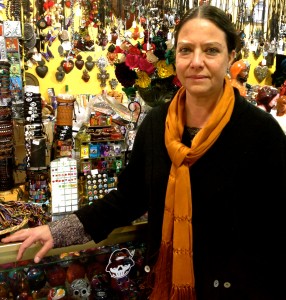WOMEN ENTREPRENEURS SYMPOSIUM, 2013
Food, Glorious Food Biz took place on December 3, 2013 from 9:00am-3:30pm @ Los Angeles Federal Reserve.
There’s no better place to grow food, explore food innovations or market food than in California. And that means opportunity, so it’s no wonder CAMEO members are serving women who want to be in the food business. Plus, women entrepreneurs are the nation’s secret ingredient in the recipe for economic growth. Women-owned firms continue to grow in number at rates exceeding the national average and represent the fastest growing segment of new businesses in California. That’s why our fifth annual women’s symposium focused on the food industry: business opportunities, financing and policy.
Relationships were the theme of the day. Evan Kleiman (bio, host of KCRW’s Good Food, cookbook author, Jerry Garcia of cooking – see photo below, right), our opening panel moderator and closing keynote brought us full circle with a life lesson about connections. When the LA Food Policy Council was formed, all of the diverse stakeholders who should be in the room were – from the farmers to the policy makers. She felt the energy change. She became a believer in the power of collaboration, a power that can result in opportunity, positive change, and solutions.
Thanks to the wonderful speakers and the engaged participants. The CAMEO staff found it very gratifying that member organizations and their clients were highly engaged and lots of business networking was sparked.
Morning Program
 The morning started off with a spirited panel discussion on food policy in Los Angeles and California that highlight business opportunities including street vending, corner store conversions, healthy food procurement, food hubs and cottage kitchens. (See below for information on panelists).
The morning started off with a spirited panel discussion on food policy in Los Angeles and California that highlight business opportunities including street vending, corner store conversions, healthy food procurement, food hubs and cottage kitchens. (See below for information on panelists).
“Since 2008, people want to do business differently,” said Dr. Glenda Humiston, who speaks with people from all over California. “They want to bring money home; they want to connect with their neighbors.” In order to build a Do-It-Yourself economy – one where people rely on their own region’s resources to create jobs and a sustainable local economy, “what’s missing is infrastructure to make things work.”
Here are some of the ideas that would ‘make things work’ that were brought up in the session.
Business opportunities
- Connect consumers to small businesses to policy makers
- Distribution access for local businesses
- Aggregate the purchasing power of small business markets
- Fill in the supply chain, e.g. slaughterhouses
- With the passage of the Urban Agriculture Incentive Zones Act (AB 551), landowners with underdeveloped land can partner with an urban farming entrepreneur. The landowners’s property tax will be frozen at the average per-acre value of irrigated cropland in California.
Other value added opportunities
- Turn more food banks are into food hubs; some are serving as local aggregators, distributors, opening cafes, etc…
- Teach food literacy in middle school and high school.
- Provide incentives for successful businesses in the food industry to 1) provide sustainable education internships and 2) open smaller scale, identical versions in low income areas as an engine of economic growth.
- Strengthen the Healthy Neighborhood Market Network that came out of the LA Food Policy Council’s work. The idea is to connect small market owners with policy makers, entrepreneurs, distribution networks for a win-win for everyone.
Overcoming legislative obstacles
- Policy needs to catch up with innovations on the ground. Some progress has been made, but there remains a lot of room for improvement.
- The cottage kitchen law was born after the LA County of Public Health shut down a breadmaker, who was selling bread made in his home to local restaurants.
- School districts and restaurants are interested in renting out their kitchens in off hours but the liability concerns need to be ironed out.
- Policies follow the money pipeline. For example, Evan Kleiman warned that the new FDA food safety rules are going to run the small farmers out of business.
Speakers:
- Evan Kleiman (bio, at right in above photo), Host of KCRW’s Good Food, cookbook author, Jerry Garcia of cooking – moderator
- Clare Fox (bio, photo 2nd from left), Director of Initiatives and Partnerships for the Los Angeles Food Policy Council.
- Glenda Humiston (bio, photo above center), State Director, California Rural Development, U.S. Department of Agriculture
- Taylor Giroux (bio), Office of Assemblyman Mike Gatto (AD 43).
Presentations:
- LA Food Policy Council’s micro-business efforts presentation.
- The cottage kitchen law.
Moderated by Constance Anderson, director of the Pacific Coast Regional SBDC and CAMEO board member, Marifel Deocampo (LA County of Public Health) and Naldo Peliks (Centro Community Partners) gave presentations on specific tools for entrepreneurs.
Marifel Deocampo walked attendees through the process of setting up a cottage kitchen operation in LA County. Visit the Los Angeles County’s Cottage Kitchen webpage for more information or call 626.430.5560 for class A food operations (dry goods) or 626.430.5400 for Class B food operations (food and milk).
Constance was super impressed with the Mobile Entrepreneurship Toolkit brought by Naldo Peliks (bio). What Naldo and his team have created is a game changer in business technical assistance delivery and has enabled them to reduce that delivery time by 80%. Their apps help business owners with their financial statements, credit plans, loans and business plans.
Lunchtime Keynote
 After everyone quieted down from a lunchtime of networking and card exchanges, Liza Braude-Glidden (bio), Co-Founder and Creative Director of Beanfields Bean and Rice Chips, showed by example the theme of the day – relationships – when she invited four women up to the dais for her keynote. She started off…
After everyone quieted down from a lunchtime of networking and card exchanges, Liza Braude-Glidden (bio), Co-Founder and Creative Director of Beanfields Bean and Rice Chips, showed by example the theme of the day – relationships – when she invited four women up to the dais for her keynote. She started off…
Food is always a conversation. Entrepreneurship is always about relationships. We women tend to excel at both…. As women, we understand that connecting with more and more people in more and more beautiful ways is what makes life worth living. And it’s also how we get things done in business.
Liza stressed the importance to connect to become larger than just one person, to think big.
Liza posed five questions to think about:
- In your food conversation, what are the ten most important relationships you can nurture?
- What businesses are you enthusiastic about? How can you co-promote with them?
- What groups might help you to think locally and globally and join a larger conversation?
- How do your passions and your food entrepreneurship combine?
- What’s one change that you are uniquely positioned to make for the future of food?
Afternoon Program
 Stacey Sanchez, president of the CAMEO Board of Directors, moderated a discussion about incubating in urban spaces, challenges and successes with:
Stacey Sanchez, president of the CAMEO Board of Directors, moderated a discussion about incubating in urban spaces, challenges and successes with:
Daniella Sawaya (bio photo left), Program Coordinator, La Cocina (story of what La Cocina does through the eyes of two entrepreneurs) and
Nancy Halpern Ibrahim (bio, see photo right), Executive Director, Esperanza Community Housing.
Nancy’s economic development program within Esperanza, El Mercado La Paloma, was developed for and by the community. Originally funders wanted to have an anchor, but El Mercado said, no, that’s not our goal. Their goal is to provide sustainable, stable economies for families in an area that experiences 21-30% unemployment in a good year. El Mercado is a vibrant community gathering space that also provides affordable retail opportunities, technical assistance, start-up capital and support. Mercado La Paloma seeks to create business ownership opportunities and living wage jobs in our community. The average business spends seven years in El Mercado before moving out. They aren’t an incubator, although some businesses do grow and need more space than El Mercado can accommodate.
La Cocina does incubate businesses and helps them become self sufficient. Many of La Cocina’s clients have become extremely successful and perhaps this is because of the organization’s screening process. The screen on low income, product viability, entrepreneurial readiness and community spirit.
Both programs do tremendous work in enabling low-income families to be lifted out of poverty and into the middle class. The challenges their clients face in urban areas include high costs of rent, capital, more regulation, navigating the permit process, more competition.
Closing Keynote
Evan Kleiman left us with some words of wisdom about the changing nature of the kitchens (that can be applied to all businesses).
In men-dominated kitchens, chefs were insular. They didn’t share, they didn’t ask each other for recipes. As women rose through the hierarchy of chefs, kitchens became less rank-oriented and more about building consensus. When farmer’s markets started proliferate, these women chefs would bump into each other and – lo and behold – have conversations. They’d see what each other were buying, they’d trade preparation tips. They became less competitive and proprietary. The SF Chronicle held an experiment called the Baker’s Dozen. Thirteen chefs were given the same cake recipe and sent off to bake. If having such a proprietary recipe was the element that made you a good chef, we would have expected all the good chefs to come back with the same yummy cake. But thirteen different cakes came back. Lesson: share, the more you hold in, the more you are cutting off from yourself – connect and collaborate!
*More resources mentioned in Liza’s keynote:
Social Venture Network
B Corp
The Non-GMO Project
Hub LA
Neat-os
The Orange Line
